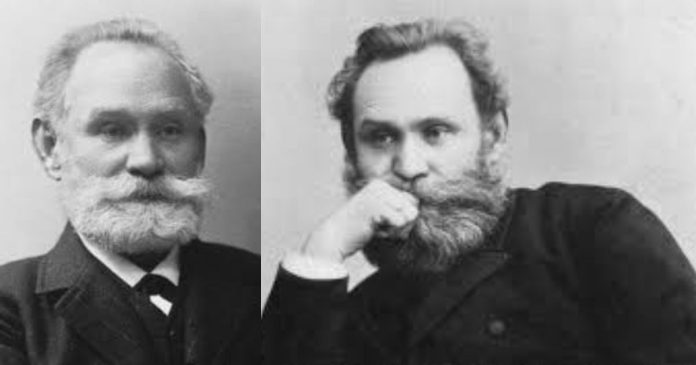Ivan Pavlov (1849–1936) was a Russian physiologist best known for his groundbreaking work in classical conditioning, a fundamental concept in behavioral psychology. Although he originally trained in medicine and was awarded a Nobel Prize in Physiology or Medicine in 1904, Pavlov’s fame comes largely from his research on the digestive systems of dogs, which led to his discovery of conditioned reflexes.
Here are the key details about Ivan Pavlov and his work:
1. Early Life and Education:
- Born on September 14, 1849, in Ryazan, Russia, Pavlov was initially interested in theology but eventually shifted his focus to science.
- He studied at the University of Saint Petersburg and later specialized in physiology, where he developed an interest in the physiological processes related to digestion.
2. Nobel Prize in Physiology:
- In 1904, Pavlov won the Nobel Prize in Physiology or Medicine for his work on the physiology of the digestive glands. His research in this area involved studying how the digestive system works in animals, particularly the role of saliva in digestion.
3. Discovery of Classical Conditioning:
- Pavlov’s most famous work began as part of his experiments on digestion in dogs. He initially set up experiments to study the salivary response of dogs when they were fed food. However, Pavlov noticed something curious: the dogs began to salivate not only when food was placed in their mouths but also when they saw the lab assistants who usually brought the food, or even when they heard footsteps.
- This observation led Pavlov to the concept of classical conditioning (also known as Pavlovian conditioning), which is the process by which a neutral stimulus (such as a bell) becomes associated with a natural stimulus (such as food), causing a conditioned response (such as salivation).
- The Classical Conditioning Experiment:
- Unconditioned Stimulus (UCS): Food, which naturally causes salivation.
- Unconditioned Response (UCR): Salivation, a natural response to food.
- Conditioned Stimulus (CS): The sound of a bell, which initially had no significance.
- Conditioned Response (CR): Salivation in response to the bell after it had been paired repeatedly with food.
Pavlov’s famous experiment demonstrated that organisms could learn to associate neutral stimuli with automatic physiological responses, and this learning process was central to understanding behavior.
4. Pavlov’s Legacy in Psychology:
- Classical Conditioning: Pavlov’s discovery of classical conditioning became one of the foundational principles of behaviorism, a major school of thought in psychology. His work influenced psychologists such as John B. Watson (who applied conditioning to human behavior) and B.F. Skinner (who explored operant conditioning).
- Behavioral Psychology: Classical conditioning was central to the development of behaviorism, a theory that focuses on observable behavior rather than internal mental processes. This perspective dominated psychology for much of the early 20th century.
5. Impact on Modern Psychology and Learning Theory:
- Conditioned Reflex: Pavlov’s work provided insight into how automatic behaviors (like salivation) could be learned through environmental cues, a concept that extended far beyond the laboratory.
- Application in Therapy: Classical conditioning has had practical applications in areas such as behavioral therapy, where techniques like systematic desensitization are used to treat phobias by associating a feared object with a calm, positive experience.
- Influence on Education: Pavlov’s work also influenced educational psychology, particularly in understanding how habits and responses are formed in children and animals.
6. Later Years and Philosophical Views:
- Although Pavlov is primarily known for his work on conditioning, he also had an interest in psychology and philosophy, particularly with respect to the idea that behavior could be understood in scientific terms.
- He was skeptical of the behaviorist approach that emerged in the United States but still recognized the importance of objective, scientific study of behavior.
- In his later years, Pavlov turned more toward studying the broader implications of conditioning and the idea of higher-order reflexes, such as those involved in human consciousness and voluntary action.
7. Death:
- Ivan Pavlov passed away on February 27, 1936, at the age of 86. Despite his fame for conditioning research, he continued to focus on the physiological aspects of his work until the end of his life.
8. Key Contributions and Summary:
- Classical Conditioning: The core concept of classical conditioning has had a profound impact on psychology, behaviorism, and learning theory.
- Scientific Rigor: Pavlov’s work was characterized by a strict adherence to scientific observation and experimentation, and he approached behavior with an empirical, objective lens.
- Understanding Behavior: His studies on conditioned reflexes helped to explain how learning and behavior could be shaped by external stimuli and environmental cues, shaping the field of behavioral psychology.
Famous Quote by Pavlov:
- “Don’t become a mere recorder of facts, but try to penetrate the mystery of their origin.”
In summary, Ivan Pavlov is remembered not just for his discovery of classical conditioning, but for his contributions to how we understand learning and behavior. His research laid the foundation for much of modern psychology, particularly in the study of how we learn associations between stimuli and responses.


